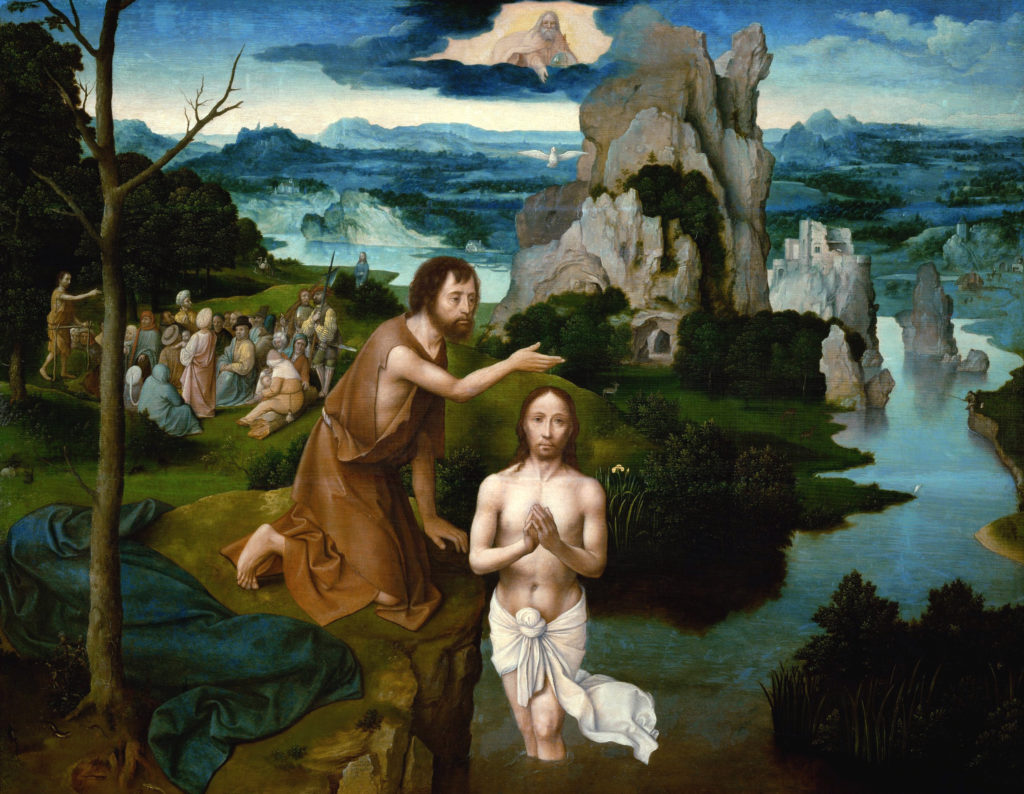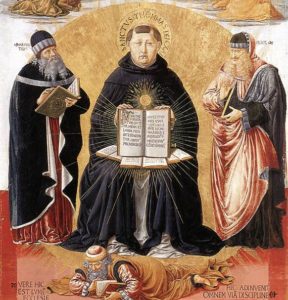Exemplaric Baptism
by Fr. William Rock, FSSP
The word “Epiphany” comes from the Greek “ἐπιφάνεια,” [epipháneia] which means “manifestation,” and the Feast of the Epiphany, kept on January 6th, the 13th Day of Christmas, commemorates three manifestations of Christ: the visitation of the Magi from the East, Our Lord’s Baptism, and Our Lord’s first miracle of turning water into wine at the wedding at Cana. While all three are interwoven in the Office for the Epiphany, the Mass of Epiphany day itself focuses on the visitation of the Magi. The Baptism of the Lord is celebrated in the Mass on January 13th, the Octave Day of the Epiphany, while the Miracle at Cana is commemorated on the Second Sunday after the Epiphany.

The recounting of Our Lord’s Baptism, in addition to presenting an important event in Our Lord’s life, also has meaning for the Faithful. This is because Our Lord’s Baptism is the exemplar, the model, of the Baptism received by the Faithful (S.T. III, q. 39, a. 5, c). What is expressed in the text of Sacred Scripture as occurring at Our Lord’s Baptism gives insight into what happens when the Sacrament of Baptism is conferred. Following St. Thomas Aquinas, the different aspects of Our Lord’s Baptism will be examined.
When Jesus was Baptized, the voice of the Father was heard saying “Thou art my beloved Son. In thee I am well pleased” (Luk 3:22, Mat 3:17, Mar 1:11). This indicates that the Faithful become, through Baptism, adopted sons of God, for as this was said to Christ, it is said also to each at their Baptism. As St. Hilary said, “the Father’s voice declares us to have become the adopted sons of God” (S.T. III, q. 39, a. 8, ad. 3).
St. Luke relates in his account of Our Lord’s Baptism “that Jesus also being baptized and praying, heaven was opened” (Luk 3:21; see also Mat 3:16, Mar 1:10). St. Thomas explains that this occurred for several reasons, which he explains as follows (S.T. III, q. 39, a. 5, c):
Christ wished to be baptized in order to consecrate the baptism wherewith we were to be baptized. And therefore it behooved those things to be shown forth which belong to the efficacy of our baptism: concerning which efficacy three points are to be considered. First, the principal power from which it is derived; and this, indeed, is a heavenly power. For which reason, when Christ was baptized, heaven was opened, to show that in future the heavenly power would sanctify baptism.
Secondly, the faith of the Church and of the person baptized conduces to the efficacy of baptism: wherefore those who are baptized make a profession of faith, and baptism is called the “sacrament of faith.” Now by faith we gaze on heavenly things, which surpass the senses and human reason. And in order to signify this, the heavens were opened when Christ was baptized.
Thirdly, because the entrance to the heavenly kingdom was opened to us by the baptism of Christ in a special manner, which entrance had been closed to the first man through sin. Hence, when Christ was baptized, the heavens were opened, to show that the way to heaven is open to the baptized.
Now after baptism man needs to pray continually, in order to enter heaven: for though sins are remitted through baptism, there still remain the fomes of sin [“an inclination of the sensual appetite to what is contrary to reason” (S.T. III, q. 15, a. 2, c)] assailing us from within, and the world and the devils assailing us from without. And therefore it is said pointedly (Luke 3:21) that “Jesus being baptized and praying, heaven was opened”: because, to wit, the faithful after baptism stand in need of prayer. Or else, that we may be led to understand that the very fact that through baptism heaven is opened to believers is in virtue of the prayer of Christ. Hence it is said pointedly (Matthew 3:16) that “heaven was opened to Him”—that is, “to all for His sake.” Thus, for example, the Emperor might say to one asking a favor for another: “Behold, I grant this favor, not to him, but to thee”—that is, “to him for thy sake,” as Chrysostom says (Hom. iv in Matth. [From the supposititious Opus Imperfectum]).

So it is that “heaven was opened” to express that the source of the power of Baptism is a heavenly source; that Baptism is the Sacrament of Faith and that by Faith the Faithful gaze on heavenly things, which surpass the senses and human reason; that the Kingdom of Heaven which was closed to the faithful by sin, is open to them by Baptism; and, that after Baptism, a man must pray in order to enter heaven for, although the way is open, he can only arrive there by prayer.
Lastly, it is reported that “the Holy Ghost descended in a bodily shape, as a dove” (Luk 3:22; see also Mat 3:16, Mar 1:10). According to St. Thomas, it was fitting that the Holy Ghost should appear in the form of a dove for four reasons (S.T. III, q. 39, a. 6, ad. 4):
First, on account of the disposition required in the one baptized—namely, that he approach in good faith: since as it is written (Wisdom 1:5): “The holy spirit of discipline will flee from the deceitful.” For the dove is an animal of a simple character, void of cunning and deceit: whence it is said (Matthew 10:16): “Be ye simple as doves.”
Secondly, in order to designate the seven gifts of the Holy Ghost, which are signified by the properties of the dove. For the dove dwells beside the running stream, in order that, on perceiving the hawk, it may plunge in and escape. This refers to the gift of wisdom, whereby the saints dwell beside the running waters of Holy Scripture, in order to escape the assaults of the devil. Again, the dove prefers the more choice seeds. This refers to the gift of knowledge, whereby the saints make choice of sound doctrines, with which they nourish themselves. Further, the dove feeds the brood of other birds. This refers to the gift of counsel, with which the saints, by teaching and example, feed men who have been the brood, i.e. imitators, of the devil. Again, the dove tears not with its beak. This refers to the gift of understanding, wherewith the saints do not rend sound doctrines, as heretics do. Again, the dove has no gall. This refers to the gift of piety, by reason of which the saints are free from unreasonable anger. Again, the dove builds its nest in the cleft of a rock. This refers to the gift of fortitude, wherewith the saints build their nest, i.e. take refuge and hope, in the death wounds of Christ, who is the Rock of strength. Lastly, the dove has a plaintive song. This refers to the gift of fear, wherewith the saints delight in bewailing sins.
Thirdly, the Holy Ghost appeared under the form of a dove on account of the proper effect of baptism, which is the remission of sins and reconciliation with God: for the dove is a gentle creature. Wherefore, as Chrysostom says, (Hom. xii in Matth.), “at the Deluge this creature appeared bearing an olive branch, and publishing the tidings of the universal peace of the whole world: and now again the dove appears at the baptism, pointing to our Deliverer.”
Fourthly, the Holy Ghost appeared over our Lord at His baptism in the form of a dove, in order to designate the common effect of baptism—namely, the building up of the unity of the Church. Hence it is written (Ephesians 5:25-27): “Christ delivered Himself up…that He might present…to Himself a glorious Church, not having spot or wrinkle, or any such thing…cleansing it by the laver of water in the word of life.” Therefore it was fitting that the Holy Ghost should appear at the baptism under the form of a dove, which is a creature both loving and gregarious. Wherefore also it is said of the Church (Canticles 6:8): “One is my dove.”
It is fitting, therefore, that the Holy Ghost appeared as a dove, for the dove signified the disposition one should have when receiving Baptism; the Gifts of the Holy Ghost which are first received in Baptism; the forgiveness of sins and reconciliation with God, and, lastly, the building up of the Mystical Body of Christ, the Church.
With the example of Our Lord’s Baptism presented on this day, and the explanation given by St. Thomas, the Faithful are invited to treasure as most precious what they have received in their Baptism, to give thanks to God for this great benefit He has freely bestowed, and to ponder these great mysteries in their hearts.
William Rock, FSSP was ordained in the fall of 2019 and is currently assigned to Regina Caeli Parish in Houston, TX.
January 13, 2023








